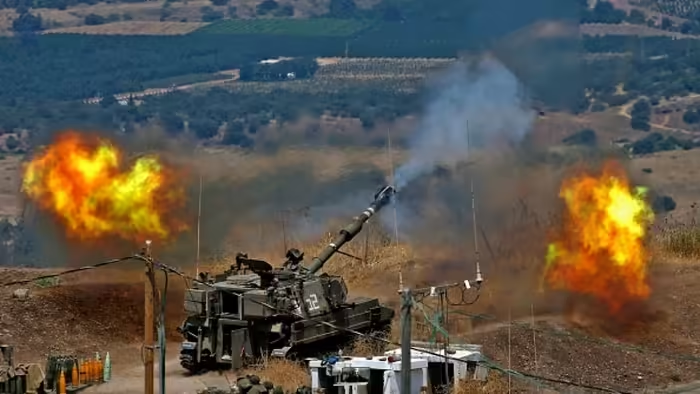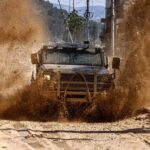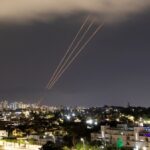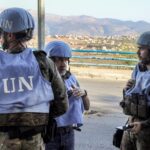By Melanie Sun
The Iran-backed terrorist group Hezbollah announced in a statement Sunday morning that it had begun its retaliation against Israel for killing its military commander, Fuad Shukr, in Beirut last month.
Footage posted to social media showed Iron Dome missiles intercepting targets coming from Lebanon in Israel’s north. Local media reported rocket sirens across northern Israel, including Golan Heights’s Katzrin as well as in several Upper Galilee border communities. Drone sirens were also reported sounding in several Galilee towns.
As the sirens rang in Israel, Hezbollah released another statement, saying that over the past hours, it had launched more than 320 rockets and several drones carrying explosives toward northern Israel. The terror group said the attacks targeted 11 military bases. It did not mention IDF airstrikes reported in Lebanon.
Earlier, Israel Defense Forces (IDF) spokesman Rear Admiral Daniel Hagari said in a video statement that Israel had identified that Hezbollah was preparing a mass attack on central Israel with missiles and rockets at 5 a.m., and in response, around 100 IDF warplanes at 4:30 a.m. conducted preemptive airstrikes on Hezbollah launchers in Lebanon, preventing a massive attack on Israel.
He said that Hezbollah managed to launch around 210 rockets and 20 drones toward northern Israel.
“After extensive identification, the IAF and Northern Command began proactively and broadly striking Hezbollah targets in order to remove the threats aimed at the citizens of Israel,” he said. “We are removing threats against the Israeli home front. Dozens of IAF jets are currently striking targets in various locations in southern Lebanon. We are continuing to remove threats, and to intensively strike against the Hezbollah terrorist organization.”
Hezbollah said in a later statement that Israel’s claims about its defensive strikes disrupting its planned attacks on central Israel were “empty claims that contradict the facts on the ground.”
Israel’s emergency medical service and blood services organization, MDA, reported in a 6 a.m. post on X that rocket and drone sirens sounded across northern Israel starting from 5 a.m. Sunday morning. It added that so far, no injuries had been reported.
Hagari also sent a warning to Lebanese civilians in southern Lebanon. “We have identified that Hezbollah is firing extensively into Israeli territory near your homes—you are in danger. We are targeting and removing Hezbollah’s threats.”
Twenty minutes earlier, it said in an update that the service had been placed “on peak alert” due to government assessments of Israel’s security situation.
The office of Israeli Foreign Minister Israel Katz said that the IDF strikes on Hezbollah in Lebanon came in response to confirmations about an imminent major missile and drone attack on Israel. After Hezbollah’s attacks, the minister reached out to numerous counterparts seeking their support for Israel’s defensive actions, stressing that Israel was acting in self-defense and is not interested in a wider war.
The White House said in response, “We will keep supporting Israel’s right to defend itself, and we will keep working for regional stability.” The Pentagon said the United States remains committed to the defense of Israel against attacks by Iran and its proxies.
Israeli Prime Minister Benjamin Netanyahu’s office said he and his defense minister, Yoav Gallant, were coordinating the Israeli response from their military headquarters in Tel Aviv. Gallant declared a “special situation on the home front,” and Netanyahu’s Security Cabinet was set to meet later Sunday morning.
The “special situation” includes measures that include some restrictions on civilian movement for at least 48 hours.
Jerusalem had said it was expecting Hezbollah to retaliate to the killing of Shukr this week after the Lebanon-based group vowed to avenge the death. It had claimed responsibility for the attack, which it said was in response to an attack that left a dozen children dead in the Israeli Golan Heights—a charge Hezbollah denied.
Hagari had said during a Saturday press conference that the military was poised in expectation of a “significant week.”
“Our readiness is very high in attack and defense,” he had said.
By 7 a.m. local time, Israel’s airport authority said that flights in Israel had resumed.
U.S. Air Force General Charles Q. Brown, chairman of the Joint Chiefs of Staff, arrived in the Middle East on Saturday and met with military leaders in Jordan to discuss options to avoid escalating war in the region. He will also meet with military leaders in Egypt and Israel.
After the Hamas terrorist group launched its Oct. 7, 2023, massacre in Israel in which about 1,200 Israelis were killed and approximately 250 taken hostage, Hezbollah followed with frequent attacks on Israeli communities and military posts along the Lebanon–Israel border. It said its actions were in support of Gaza amid Israel’s vow to eliminate Hamas.
So far, the fighting to Israel’s north with Hezbollah has resulted in dozens of civilian deaths as well as the deaths of IDF members. Hezbollah has named over four hundred of its members who have been killed by Israel, mostly in Lebanon but some in neighboring Syria. Dozens of civilians have also been reported killed in Lebanon amid the fighting.
More than 60,000 residents of northern Israel were displaced from their homes for months following Oct. 7 because of concerns that Hezbollah might launch a similar cross-border attack as Hamas did. They continue to remain displaced within Israel.






